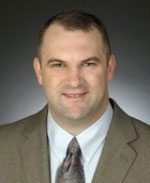Research to focus on well water near rural drilling sites.
A University of Texas at Arlington chemistry professor will assist in a new study to examine rural well water from areas near natural gas drilling sites to provide clear, accurate information about the potential impact of chemicals used to extract gas from rock formations. Kevin Schug, assistant professor of chemistry in the College of Science, will work with independent researchers with support from Assure Controls, a product development and marketing company in San Diego, Calif. The research team aims to test for contamination in water well samples from more than 100 locations.
Kevin Schug, assistant professor of chemistry in the College of Science, will work with independent researchers with support from Assure Controls, a product development and marketing company in San Diego, Calif. The research team aims to test for contamination in water well samples from more than 100 locations.
“This is an important study for us to undertake because North Texas is so heavily invested in natural gas production,” Schug said. “We want to help figure out if there are valid environmental and health concerns associated with these operations, especially in more rural areas where well water quality is not specifically regulated by EPA.”
Hydraulic fracturing is a process by which a blend of water, sand and other agents is pumped into a well at high pressure, cracking rock formations up to a mile underground and releasing natural gas. It has been used widely in North Texas’ Barnett Shale and other natural gas formations across the country, allowing access to previously untapped reserves.
In reaction to concerns about the process, the U.S. Energy Secretary Steven Chu earlier this month formed a panel of experts to make recommendations regarding the safety and environmental performance of natural gas hydraulic fracturing from shale formations.
Schug and others involved in the study will use Assure’s QwikLite Biosensor System, a sensitive, rapid and affordable water quality test for toxicity caused by any type of organic, inorganic and heavy metal compound. They will do further testing to determine what contaminants, if any, are in the samples.
Geospatial and statistical analysis will be used to examine correlations between hydraulic fracturing and the composition of the well water, said Laura Hunt, a member of the research team who previously conducted her post-doctoral research at UT Arlington.
Assure Controls is supporting the study out of an interest in the quality of well water, company officials said. While the Environmental Protection Agency regulates public water systems, it does not regulate private drinking water wells, which account for approximately 15 percent of U.S. drinking water supplies. Unlike public drinking water systems, experts do not regularly monitor water source and quality for private wells, the company said.
In addition to faculty members who are working to measure water quality, UT Arlington is involved in making information about air quality near natural gas well sites available to the public.
The Texas Commission on Environmental Quality has contracted with UT Arlington for the purchase, installation and operation of air quality monitors in Arlington and surrounding areas. The program will provide valuable data to address environmental impact issues, including those related to natural gas drilling.
For more information about submitting a water sample, please email the research team at txwellstudy@gmail.com. Information is also available at https://sites.google.com/site/txwellwaterstudy/home.
Source: University of Texas at Arlington, edited by Green Source DFW
Media contact: Traci Peterson, (817) 272-9208, tpeterso@uta.edu









